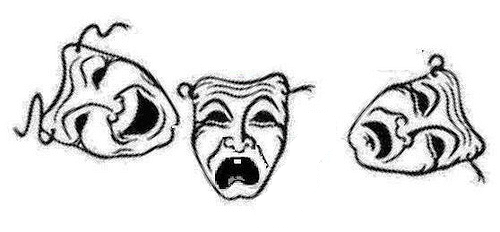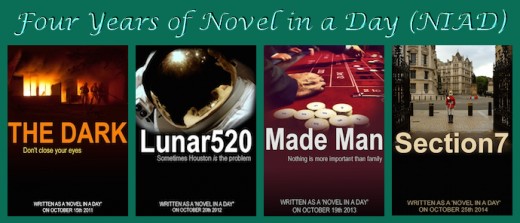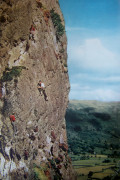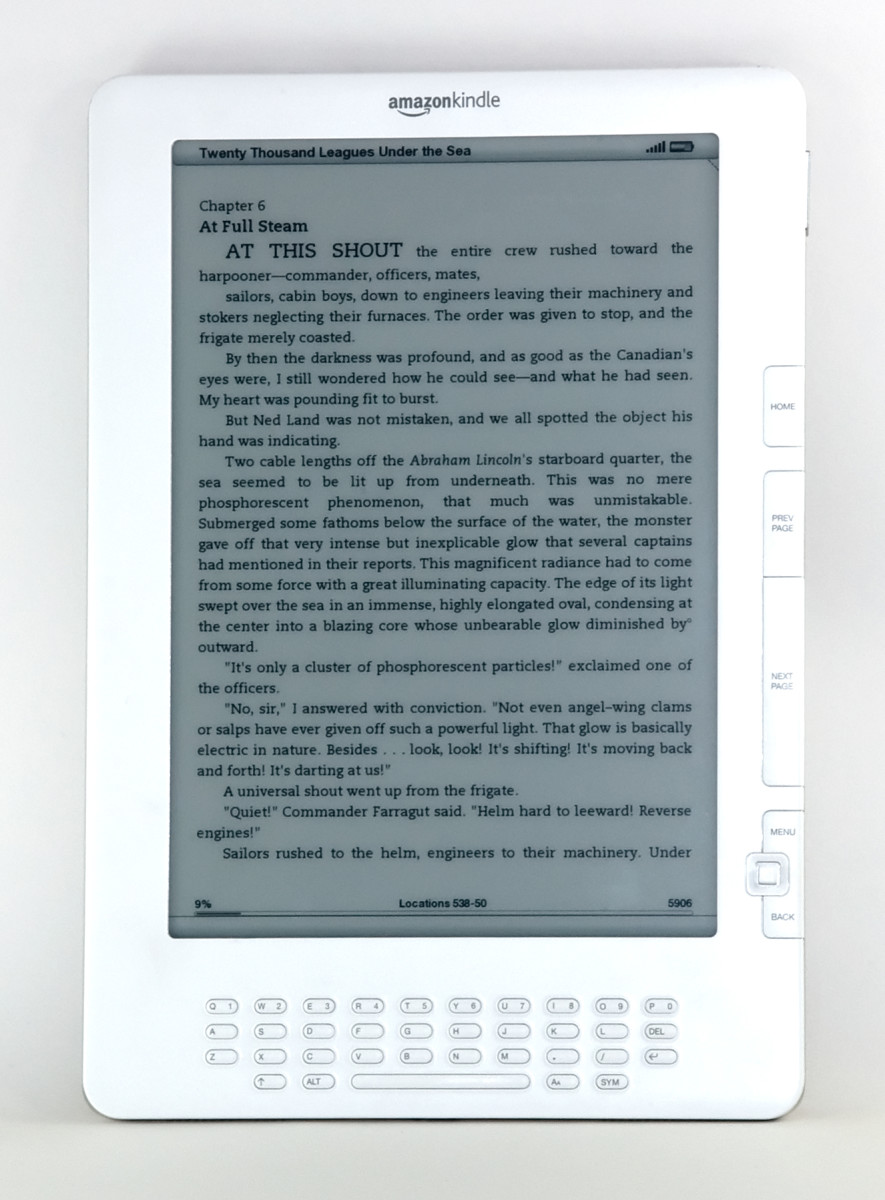Novel In A Day (NIAD)
So What Do You Know About NIAD?
view quiz statisticsWhat Writers Get Up To When There's Something To Get Up To
I have a confession to make. There is one day of the year, each year, for the last four years, for which I have cleared my entire calendar of work, appointments, obligations or anything else Real Life (RL) throws at me. RL and I have come to a delicate agreement. I endure the rest of the year, but this one day of the year is mine, all mine. I even take at least one day off, if not two, for the event. Then, I go into hiding. I don't come out of my hidey-hole until the task at hand is complete. No, I don't starve or go thirsty. I start shopping the week before for provisions. I even make a jaunt out the day before to the sushi counter at the local supermarket to get a tray of the good stuff for the next day. It keeps well enough in the fridge. What have I gotten up to?
What could be so all-fired important? Novel in a Day (NIAD). I have the most fun that day of any I can scare up the rest of the year. Pigfender, in Truro in the UK, hosts a gathering of writers via the internet in a once-a-year event. The event is to write an entire novel in one day. We have accomplished this colossal task successfully each year. No, not one novel per each writer, but one chapter per writer for the novel under way.
The meeting place for these dedicated writers is on the Literature and Latte website in the Novel in a Day topic. Literature and Latte is the website which houses Scrivener. Please see my interview with Keith Blount. Though you don't have to use Scrivener to participate in NIAD, you can't go wrong if you do.
Without further ado, please welcome Pigfender, the creator and annual host for Novel in a Day.
Contact information for Pigfender and NIAD:

Where It All Began
Arachnea: Pigfender, how did you come up with the idea for NIAD?
Pigfender: It was a classic cocktail of one shot bravado mixed with two shots trying to be funny (add ice, shake well and serve with a very colourful umbrella).
On 3:17pm Friday August 5th, 2011, someone posted a link on the Literature and Latte internet forum to an article which claimed to have a formula for writing a book in three days. At 3:52pm, I’d seen the post and responded with a fairly harmless reply, basically complaining that if you write to a formula you’ll end up with formulaic writing.
Normally I’d have left things at that, but it was a busy day in the office so this idea steeped in the back of my mind for several more hours while I was working. At 10:26pm (probably on the train home) I posted again. In an attempt to be funny I declared that three days was rubbish; the route taken by “wimps and amateurs”. If you were any good, I proposed, you’d get it done in a day. The secret... was MANPOWER. I even laid out 11 bullet points worth of how the event would work (which as it turns out have remained pretty much unchanged to this day), although I really wasn't expecting anyone to take it seriously. I certainly wasn’t taking it seriously myself.
By the time I woke up the next morning, several people had enthusiastically signed up, including Michael Bywater (who shall go down in history, amongst other far more notable things, as the first ever person to sign up to a NiaD) and Keith Blount (who well may have been typing under the influence). Over the next few days the response was positive enough that we set a date, and I started seriously trying to think of a plot that wouldn’t embarrass me in public (but that’s another story).
So, if that Friday had been a normal day in the office -- if I’d left at 6pm instead of after ten -- there wouldn’t be a NiaD today. Then again, if I hadn’t spend the afternoon mulling over writing events in the back of my mind, I probably could of left earlier.

The Good, The Fun and The Not-fun ... .
Arachnea: What do you like best about NIAD?
Pigfender: The feedback on this has been pretty consistent across the people taking part: it’s the event’s unique ability to allow participants to focus purely on the craft of writing for a change. NiaD imposes some unusual constraints on participants (not least of all being unaware of your place in the wider plot) but in return it removes a lot of the normal pressures people face when they sit down in front of the keyboard. For some, it’s the freedom from the WIP and ability to focus on writing for writing’s sake. For others, it’s the freedom from worrying about the plot itself to focus on telling the story.
From my own perspective, the ‘best thing’ certainly isn’t removal of worrying about the plot! I think the thing I like the most about the event is the opportunity to benchmark yourself as a writer and get a better sense of your own strengths, voice and style. There are so few opportunities to look at your work lined up against others produced in the same time constraints, with the same level of preparation and on the same story. The way the story baton is passed from author to author across the chapters allows possibly the clearest way currently available to understand what makes your writing voice distinctly you… and it only takes a day!
Arachnea: What's the most fun for you with NIAD? The least fun?
Pigfender: The most fun is reading the submissions as they come in… as long as it’s early enough in the day that I can still do it at a leisurely pace.
After about 7pm, the responses start arriving thick and fast, and so I’m really just skim reading for wrong names and spelling mistakes (yes, despite every word processor in the world having a spell checker, apparently I still need to make this basic correction for some people). But before then, when you’ve just got the early responders hitting the inbox, I can take the time to enjoy reading the chapters. Every year I’m fascinated by the directions people take the basic premise in, and how much each writer injects of their own style and imagination into it. I mentioned this in the introduction to 2012’s “Lunar520”, but it’s still true; the author’s creativity comes out in every single word.
The least fun is easy: It’s when people get angry or defensive with me on email, usually because they've misunderstood the event. I’ve even had one person submit a chapter that bore no relation to their brief at all! Different location, different characters, different plot. They got pretty shirty when I politely pointed out that they’d signed up to try to write the *same* novel as everyone else!
While I do still get some aggravation, having a back catalogue of books and a detailed FAQs has reduced the potential for participants to get the wrong idea and has therefore muted the emotions I have to deal with somewhat. With more and more people finding NiaD because they’ve been told about it by someone else who’s taken part, this sort of thing should hopefully become a thing of the past.
Would you participate in NIAD?
If you had the opportunity, would you sign up for Novel in a Day?
Thinking About Now and Further Along
Arachnea: What would you like NIAD participants and future participants to know about NIAD?
Pigfender: Since you’ve not restricted me, I’m going to pick three things here (in no particular order):
Firstly, it's that those finished books are a big deal to a lot of people, who want to proudly show them off to their friends and families, post them on their blogs, and such the like. Unlike something like NaNoWriMo (which is a great event by the way, and NiaD is deliberately scheduled for October to encourage people to do both), if you don’t do it properly it’s not just you that’s affected. Naturally, I don't expect people to spend as much time on it as I do, but I’d prefer participants take it a bit seriously and not just chuck a couple of casual hours at it after they get home from a party.
Secondly, I think it’s good that people realise that NiaD is *supposed* to be hard! There’s a quote from Matt on page 3 of the NiaD FAQs where he describes his emotional changes each time he takes part, moving from (I’m paraphrasing, but along the lines of) “How am I supposed to be able to write about this?” through “Ok, but how am I supposed to stretch it to 1,500 words” and finally on to “That was awesome”. We call NiaD a writing EVENT, but really it’s a writing CHALLENGE. It’s meant to tax your creativity by taking you away from wherever you were and placing you right in the middle of somewhere you’ve never been before. It’s difficult, but it can’t kill you and you might learn something about yourself as a writer by the end of it.
Thirdly, NiaD is a collaborative writing exercise. One of the major advantages of that is that there are a whole bunch of likeminded people doing exactly the same thing as you at the same time. I know everyone has different writing rituals and yours might be lock yourself away in a room, but if you can, you should at least stop by the internet forum and take part in the banter!
Arachnea: Where would you like NIAD to be in one year? Five years?
Pigfender: Up until now it’s not been that structured. NiaD is a fair amount of work as it is, so sitting down and planning what the next few years are like is something I’m only just getting round to now after our fourth year.
The 2014 event (“Section 7”) was a bit of an experiment, introducing a second version of the same story for the first time. I think the cross-book comparison adds a great extra dimension, even if the extra work on the day meant that I had to step out of writing a chapter myself this time. So next year’s event will definitely include that, and maybe we’ll be able to expand further and have a third or fourth version as well!
As for the grand five-year plan... There are lots of things I’d like to be able to eventually include, such as foreign language versions (there *might* be a Spanish version ’Novela-en-un-Día' next year), running more than one story at the same time, and maybe even making a print copy of the book available. I’m also looking into things like t-shirts, winners ‘badges’ for inclusions on sites and forums, and all sorts of other things. There’s no set roadmap for all of this, so how soon any of this materialises boils down to finding the time. Maybe that should be my main goal on the one-year plan: write the five-year plan properly!

Juggler Extraordinaire
Arachnea: What balls do you have in the air during a NIAD twenty-four hour session? How do you keep them all from hitting the ground?
PigFender: Firstly, let’s list out the ‘balls’ I have to juggle during the day:
- At midnight my day ‘starts’ with me sending out the briefs. Note that, since NiaD is on a Saturday, I’ll already have been awake since 6:30am the previous morning by this point.
- Respond and resend any briefs that got lost somewhere to participants who let me know. In the first year, I tried chasing people who hadn’t confirmed receipt, but due to all the different timezones people are writing from it’s simply not possible to actively chase confirmation; lot’s of people are still asleep!
- Respond to questions as they come in. These range from queries on format / structure, through to things like attempts to get extra plot information, checks to see if having a character do XYZ will create a continuity clash, and efforts to understand character motivation. Last time I received over 250 emails and forum messages on the day, which averages about 1 every 5 minutes for the 24 hour period.
- Design the front cover and write the introduction.
- Read and provide comments on chapters as they come in, importing them into the Scrivener project as I do. I don’t *need* to (because Scrivener will automatically override all this in compile anyway) but I also quickly switch all the formatting to my default style to make it more consistent to read on screen and also to make a better looking .scriv file for when I share that after the event.
- Set up Front Matter and compile formats in Scrivener, and compile epub, mobi and pdf versions for each volume of the book. I also open and test the books for any formatting errors that my tired brain has let slip in.
- Publish on the internet. Last year’s novels went live at 2:38am on Sunday morning, which might seem like a long time after we finished writing (2 hours 38 minutes), but remember that that time was taken producing SIX different versions of the book, and was achieved by a guy who’d been awake for over 44 hours straight. I can’t imagine trying to achieve all of this without Scrivener made by Literature and Latte (who also generously host the NiaD internet forum as well) so I guess I should give them a shout out at this point!
That's about it for the day. I'll try to squeeze eating food in there somewhere, but there's little time for much else. The first three years I wrote a chapter (randomly assigned just before midnight) as well, but with twice the participants this year I decided to give myself a break on that one!
As for how I stop those balls hitting the ground... I don't! Mistakes happen. I just drink a lot (and I mean a *lot*) of tea, and make sure when they do hit the ground, I pick 'em right back up again!
The Why
Arachnea: Why? With all the effort you put into it and your managing the entire event almost entirely on your own, why do you do it?
Pigfender: Ultimately because I love stories. I love books, movies, anything. I love hearing stories and I love telling them, and this is one more way to tell and hear stories.
Sometimes I think that the fact that I’m willing to let others run with the plots I come up with means that I’m a very laid-back kind of a guy. Other times I suspect it’s because I'm *so* controlling that I want to dictate what other people write about too. Which ever it is, the bottom line is that I get to read books that I’m excited about, but that simply wouldn’t get written otherwise. That’s probably why I do it!

The Novels
There are four novels available as a result of the combined efforts by writers with various levels of accomplishment:
- The Dark - 2011
- Lunar 520 - 2012
- Made Man - 2013
- Section 7 - 2014
You'll find them all on the NIAD website.
© 2014 Tanya Jones



